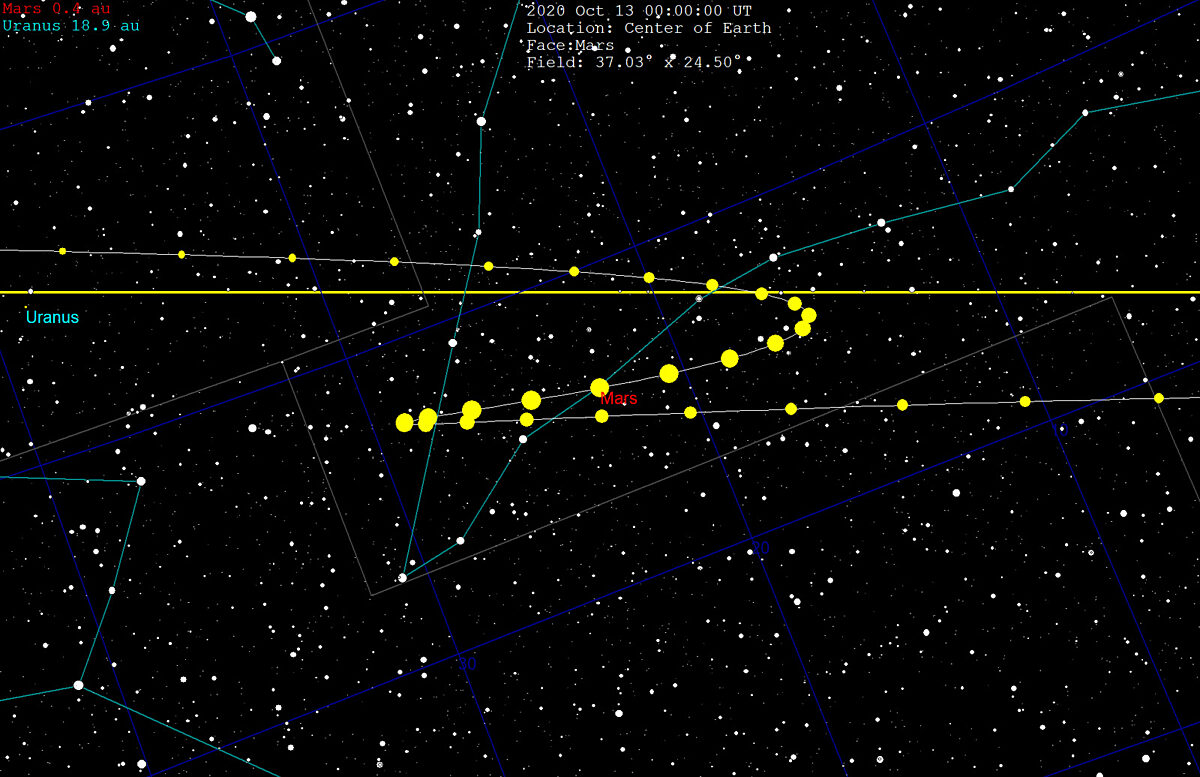Kate Howells • Apr 19, 2023
What does “Mercury in retrograde” actually mean?
Three or four times a year, the planet Mercury becomes a trending topic online. This isn’t because of new scientific discoveries being made, or new missions launching to study the rocky world. It’s because Mercury enters into a period of retrograde orbit, which is popularly believed to have astrological significance. If you’ve seen the term “Mercury in retrograde” and aren’t sure what to make of it, here are the facts.
What does it mean for a planet to be in retrograde?
When we say that a planet is in retrograde it means that from the perspective of Earth, a planet’s motion across the sky goes backwards night after night compared to its usual direction for a period of time. This happens when Earth overtakes a slower-moving planet in its orbit around the Sun, or is overtaken by a faster-moving planet.
Retrograde motion is technically called “apparent retrograde motion” since it’s not an actual change in the planet’s motion through space, but rather an effect caused by our perspective from Earth.

What causes retrograde motion?
Every planet moves around the Sun in the same direction. Normally, when you observe a planet’s location in the sky over several nights, each night it will appear to have moved a little farther in one direction relative to the stars behind it. When a planet is in retrograde, it appears to move a little farther to the opposite direction each night instead.
This happens because the closer a planet is to the Sun, the faster it moves in its orbit around the Sun. This means that Mercury and Venus move through space more quickly than Earth, and will occasionally lap Earth just like runners moving more quickly around a track. Likewise, the more distant planets Mars, Jupiter, Saturn, Uranus, and Neptune all move slower than Earth, and will occasionally be lapped by Earth.
Just like runners on a track, when a faster runner catches up to and then overtakes a slower one, the slower one’s motion relative to the faster one is backwards, even though both are moving forwards.
The same thing happens when Earth catches up to and overtakes a slower-moving outer planet. Mars, for example, usually shows up a little farther to the east every night relative to the background stars. But when Earth catches up to and overtakes Mars in their orbits, Mars will appear to stay in the same place each night for a while, then start to appear farther to the west night after night instead. Once Earth gets far enough ahead of Mars that they aren’t side by side in their orbital paths, the illusion is broken and Mars appears to move forwards (west to east) relative to background stars again.

The point in time when Earth first catches up to a farther-out planet is also called opposition, and is when that planet is on the opposite side of the Earth from the Sun. It’s also the best time for observing a planet, since it’s at its closest point to Earth, making it look bigger and brighter.
What causes Mercury’s retrograde motion?
Retrograde motion works a little differently for Venus and Mercury. Because these planets orbit between Earth and the Sun, we tend not to see them high in the night sky. We mostly see them in the morning or evening, when they aren’t either directly between us and the Sun or on the far side of the Sun. Most of the time, both planets move from east to west in Earth’s skies. But as Mercury, for example, speeds past Earth in its super-fast orbit and starts to turn around the Sun to pass to the other side, we see it slow in its east-to-west motion and start to move in the opposite direction as it takes that turn.
Because Mercury only takes 88 days to orbit the Sun compared to Earth’s 365, it overtakes us in this way three to four times a year, appearing to move backwards for about three weeks at a time. This frequency is probably the reason that Mercury’s is the most famous of the retrogrades, although its recent popularity as an explanation for things going awry may have roots in pop culture. But rest assured, there’s no scientific evidence that any planet’s apparent retrograde motion affects you at all.
Support our core enterprises
Your support powers our mission to explore worlds, find life, and defend Earth. You make all the difference when you make a gift. Give today!
Donate

 Explore Worlds
Explore Worlds Find Life
Find Life Defend Earth
Defend Earth

